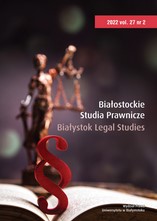Smak jako przykład niestandardowego przedmiotu ochrony w polskim prawie własności intelektualnej
Taste as an Example of a Non-Standard Subject of Protection in Polish Intellectual Property Law
Author(s): Piotr ŚlęzakSubject(s): Commercial Law
Published by: Temida 2
Keywords: flavour as a trademark; legal protection of the quality of taste; taste as a piece of work; taste as a trade secret;
Summary/Abstract: In this text, I put forward the thesis that the taste of a dish or food product may be protected under intellectual property law. As is known, intellectual property law protects the creations of human intellect. Culinary, perceived by recipients mainly through the prism of taste, is undoubtedly one of the many areas in which human ingenuity is manifested. Therefore it is not surprising that the protection covers various intangible goods related to the taste of dishes and culinary products, such as quality labels, trademarks, works and legally protected secrets; one can and should ask about the ‘saturation’ of culinary issues with intellectual property. This study is an attempt to indicate the legal institutions applicable to the protection of culinary arts. It is disputed whether taste can be considered an object of copyright protection (in a work). This is due to the difficulty in identifying the elements of creativity in cooking. These elements can be indicated in the taste as being a derivative of the composition of the ingredients of the dish, their proportions and the harmony between them. There is no doubt that taste can be protected under the Protected Designation of Origin, Protected Geographical Indication and Traditional Speciality Guaranteed institutions, and as a sign of secrecy, be it by a cook or an entrepreneur employing a cook. On the other hand, the possibility of registering a taste as a trademark should be rejected.
Journal: Białostockie Studia Prawnicze
- Issue Year: 1/2022
- Issue No: 27
- Page Range: 75-93
- Page Count: 19
- Language: Polish

